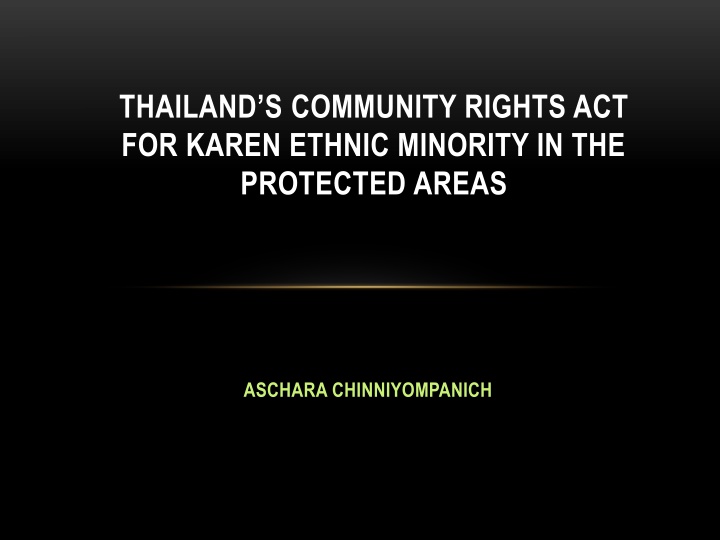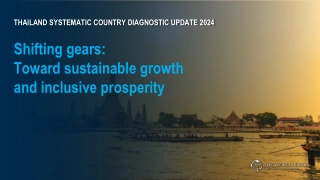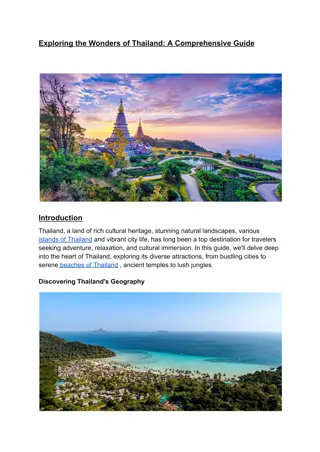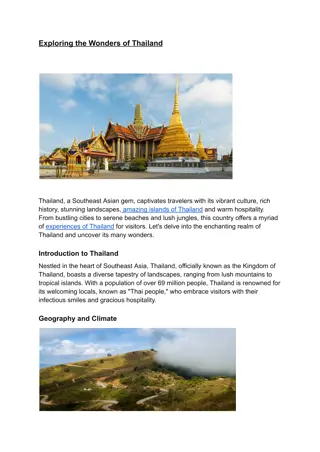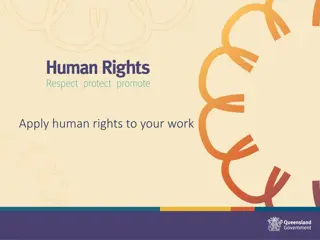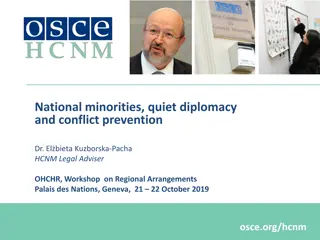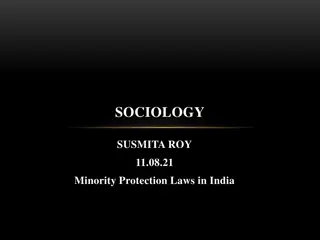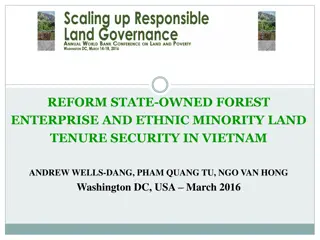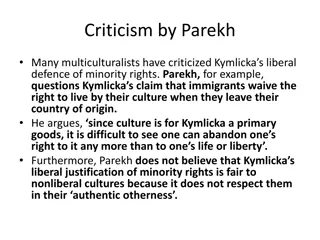Thailand's Community Rights Act for Karen Ethnic Minority
The Karen ethnic minority in Thailand faces challenges regarding community rights, as seen in the Kaeng Krachan case, highlighting disputes with authorities. The 2017 Constitution emphasizes environmental and community rights, aiming for rural sustainability while promoting diversity and cultural preservation.
Download Presentation

Please find below an Image/Link to download the presentation.
The content on the website is provided AS IS for your information and personal use only. It may not be sold, licensed, or shared on other websites without obtaining consent from the author.If you encounter any issues during the download, it is possible that the publisher has removed the file from their server.
You are allowed to download the files provided on this website for personal or commercial use, subject to the condition that they are used lawfully. All files are the property of their respective owners.
The content on the website is provided AS IS for your information and personal use only. It may not be sold, licensed, or shared on other websites without obtaining consent from the author.
E N D
Presentation Transcript
THAILANDS COMMUNITY RIGHTS ACT FOR KAREN ETHNIC MINORITY IN THE PROTECTED AREAS ASCHARA CHINNIYOMPANICH
PROBLEM The Kaeng Krachan case was the most severe dispute between an ethnic minority group and the Thai authorities in Thailand s history. (Surapong Kongchantuek)
ENVIRONMENTAL RIGHTS ECOCENTRIC PERSPECTIVE Government Officers Ethnic people Environmental protection Environmental protection / exploitation Legal rights Human rights
COMMUNITY RIGHTS 2017 Constitution Right to conserve and restore custom, traditional knowledge, art, and culture in s43(1) Right to the management, maintenance, preservation and exploitation of natural resources and the environment (Right to access community resources) in s43(2) Right to access to justice in s41(3) as the procedural environmental rights Right to access to environmental information in s41(1) as the procedural environmental rights Right to participate in environmental decision-making in s43(3) as the procedural environmental rights
STATE POLICIES ON THE ETHNIC GROUPS 2017 Constitution The State should promote and provide protection for different ethnic groups to have the right to live in the society according to the traditional culture, custom, and ways of life on a voluntary basis, peacefully and without interference, insofar as it is not contrary to public order or good morals or does not endanger the security of the State, health or sanitation (s70)
RURAL SUSTAINABILITY a continuous search for development strategies (aimed at a general improvement in the human condition) to maintain and produce healthy rural communities in which economic, socio-cultural, political and environmental values are compatible and which respond to any imperatives in theses dimensions, at least on the long run.
AUSTRALIA Stolen generation In the 1950s, following more than 150 years of violence against and dispossession of Aboriginal people, Australia formally adopted a policy of assimilation and as many as one in three Aboriginal children were forcibly removed from their families and communities. The children were placed in dormitories and other institutions, non-Indigenous foster homes or adopted by non-Indigenous families. Mabo s land case The judgments of the High Court in the Mabo case recognised the traditional rights of the Meriam people to their islands in the eastern Torres Strait. The Court also held that native title existed for all Indigenous people in Australia prior to the establishment of the British Colony of New South Wales in 1788.
LIBERIA Community Rights Law with respect to Forest Lands (2009) (Liberia) Regulation to the Community Rights Law with respect to Forest Land (2011) (Liberia)
How should the Community Rights Act promote the rural sustainability, sustainable environment, and community rights of the Karen in the protected area in Thailand?
THAILANDS COMMUNITY RIGHTS ACT - Ethnic groups are the right holders under this Act. They shall exercise their rights collectively under this Act as environmental guardians.
THAILANDS COMMUNITY RIGHTS ACT - In achieving the purpose of this Act, all ethnic groups that exercise function and power under it in relation to managing the use, development, and protection of natural and physical resources, shall recognise and provide for the following matters of national importance; A. the preservation of the natural character of the coastal environment (including the coastal marine area), wetlands, lakes and rivers and their margins, and the protection of them from inappropriate subdivision, use, and development: B. the protection of outstanding natural features and landscapes from inappropriate subdivision, use, and development: C. the protection of areas of significant indigenous vegetation and significant habitats of indigenous fauna: D. the maintenance and enhancement of public access to and along the coastal marine area, lakes, and rivers: E. the relationship of ethnic groups and their culture and traditions with their customary lands, water, sites, and other ways of life: F. the protection of historic heritage from inappropriate subdivision, use, and development: G. the protection of protected cultural rights: H. the management of significant risks from natural hazards
THAILANDS COMMUNITY RIGHTS ACT - In achieving the purpose of this Act, all ethnic groups that exercise function and power under it in relation to managing the use, development, and protection of natural and physical resources, shall have particular regard to the following;A. the preservation of the natural character of the coastal environment (including the coastal marine area), wetlands, lakes and rivers and their margins, and the protection of them from inappropriate subdivision, use, and development: A. environmental guardianship: B. the ethic of stewardship: C. the efficient use and development of natural and physical resources: D. the maintenance and enhancement of amenity values: E. the intrinsic values of ecosystems: F. the maintenance and enhancement of the quality of the environment
THAILANDS COMMUNITY RIGHTS ACT Communal land is defined as land, including forest land, owned and exploited by an ethnic group based on long-standing rules recognised by the community before it was announced as an environmentally-protected area owned by the State. This land is occupied or used subject to the shared rules or norms and customs of that community. It is not necessary for the land to have been registered under the Land Code to be recognised as communal land. Community-based natural resource management is defined as activities that are undertaken by an ethnic community in order to manage the natural resources for which the community has customary tenure or other forms of guardianship. Community-based natural resources management plan is defined as a plan co-entered into by an ethnic community with the authority to exploit and preserve natural resources.
THAILANDS COMMUNITY RIGHTS ACT Ethnic groups are defined as groups of people within Thai society, who have their own race, tradition, culture and language and who uphold different traditional practices based on the folk wisdom of generations.. Environmental guardians are defined as ethnic groups who guard and protect the natural and physical resources of their ancestral lands in accordance with their culture and traditions. This also includes the ethic of stewardship.
THAILANDS COMMUNITY RIGHTS ACT Ethnic groups have the right to reject and/ or negotiate the terms and conditions for the exploration of natural resources in their ancestral areas for the purpose of ensuring the protection and conservation of ecological, economic, cultural and social considerations. Ethnic groups have the right to an informed and intelligent participation in the formation and implementation of any project, government or private, that will affect or have an impact on their ancestral domains This includes just and fair compensation for any damages they may sustain as a result of the project and effective measures to prevent any interference and encroachment upon these rights.
THAILANDS COMMUNITY RIGHTS ACT An environmental impact assessment, human health impact assessment, and social/ cultural impact assessment shall be conducted for any activity that is proposed to be established on and/or adjacent to the ancestral lands and domains. Ethnic groups have the right to access to justice in environmental matters that is fully facilitated by the State such as funding, interpreter and lawyer. A non-governmental organisation has the standing to sue to protect the rights of ethnic groups and their environment. However, a lawsuit brought by a non-governmental organisation does not restrict the right of ethnic groups to bring their case to court.
